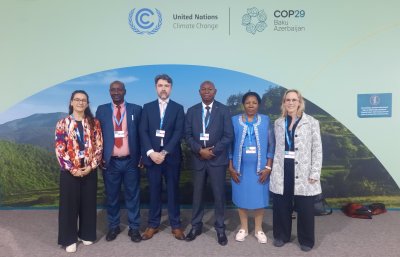COP29: Enabel welcomes climate financing from the Walloon region for the preservation of lake Kivu and Tanganyika in Africa
Enabel is announcing a partnership with the Walloon Region, which will provide 2 million euro in funding for the European TAKIWAMA project, implemented by the Belgian development agency Enabel, and aimed at improving the management and conservation of lakes Kivu and Tanganyika in Central Africa. The Tanganyika Kivu Water Management Project (TAKIWAMA), with a total budget of 31 million euro, is part of the Team Europe Initiative on Transboundary Water Management in Africa, which aims to improve cooperation between African countries for the sustainable management of shared water resources. This initiative is essential because Africa has a large number of transboundary rivers and lakes shared by several countries.

TAKIWAMA is partly implemented by the Belgian development agency Enabel. The funding from the Walloon Region is in addition to the 11.5 million euro that Enabel is managing for the project. The money is to be used in particular to monitor the state of the environment around the lakes, the impact of climate change and biodiversity.
Climate change is causing water levels to rise. In addition, the lakes are facing pollution, over-fishing, deforestation and rapid urban development on their shores.
Enabel's activities under the project are aimed at improving water management in the two lakes. In collaboration with the local authorities, a cross-border monitoring system is being set up to keep a close eye on the state of the environment. The effects of climate change will be monitored using a cross-border monitoring system.
The Walloon money, which is part of its international climate funding programme for 2025, will be used to build two environmental and climate monitoring centres on the southern shores of Lake Tanganyika, in Nsumbu (Zambia) and Kipili (Tanzania). In addition, the network of meteorological stations around the lake will be extended and strengthened, and equipment will be provided to monitor biodiversity. The monitoring centres will be built using local building materials and equipped with renewable energy sources to minimise the impact on the environment.
“We are particularly pleased that the Walloon Region has placed its trust in us for this important project,” says Jean Van Wetter, CEO of Enabel. “The cross-border nature of climate change manifests itself very strongly in this region, and it is only when we work across borders with different partners and pool our knowledge and resources that we can make a concrete difference.”
“By supporting the TAKIWAMA project, Wallonia is contributing to the sustainable management of vital resources such as water. This project illustrates our conviction that international solidarity must be translated into concrete and ambitious actions to respond to the climate emergency and strengthen the capacity of communities to cope with its impacts,” says Cécile Neven, Minister for Climate, Energy, the Air-Climate Plan, Housing and Airports.
Lake Kivu (2,700 km²) is one of the lakes in Africa's Great Lakes region, on the border between Rwanda and the Democratic Republic of Congo. The Rusizi river rises in this lake and flows into Lake Tanganyika further south. At 32,900 km², Lake Tanganyika is slightly larger than Belgium (30,500 km²). It contains 18% of the world's fresh surface water, and is a unique ecosystem with exceptional endemic biodiversity.